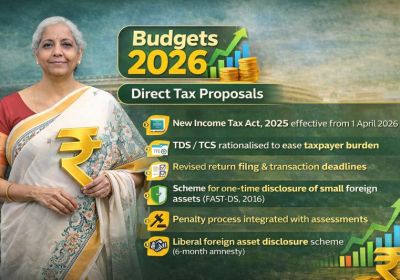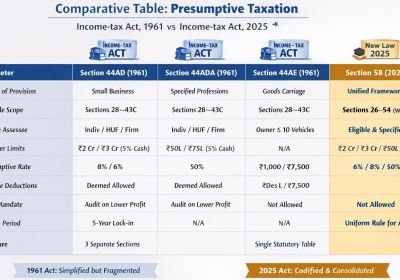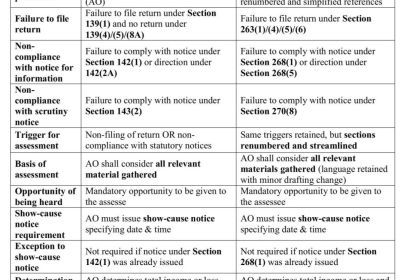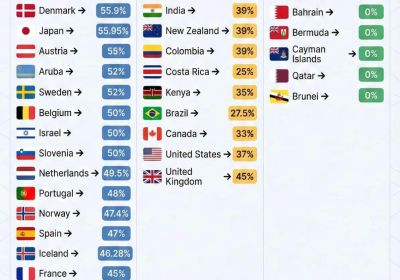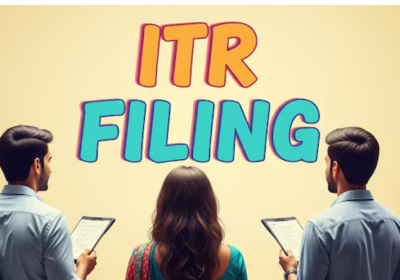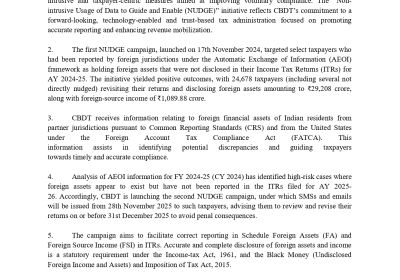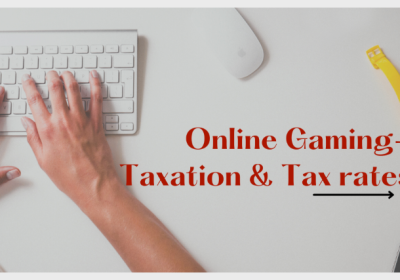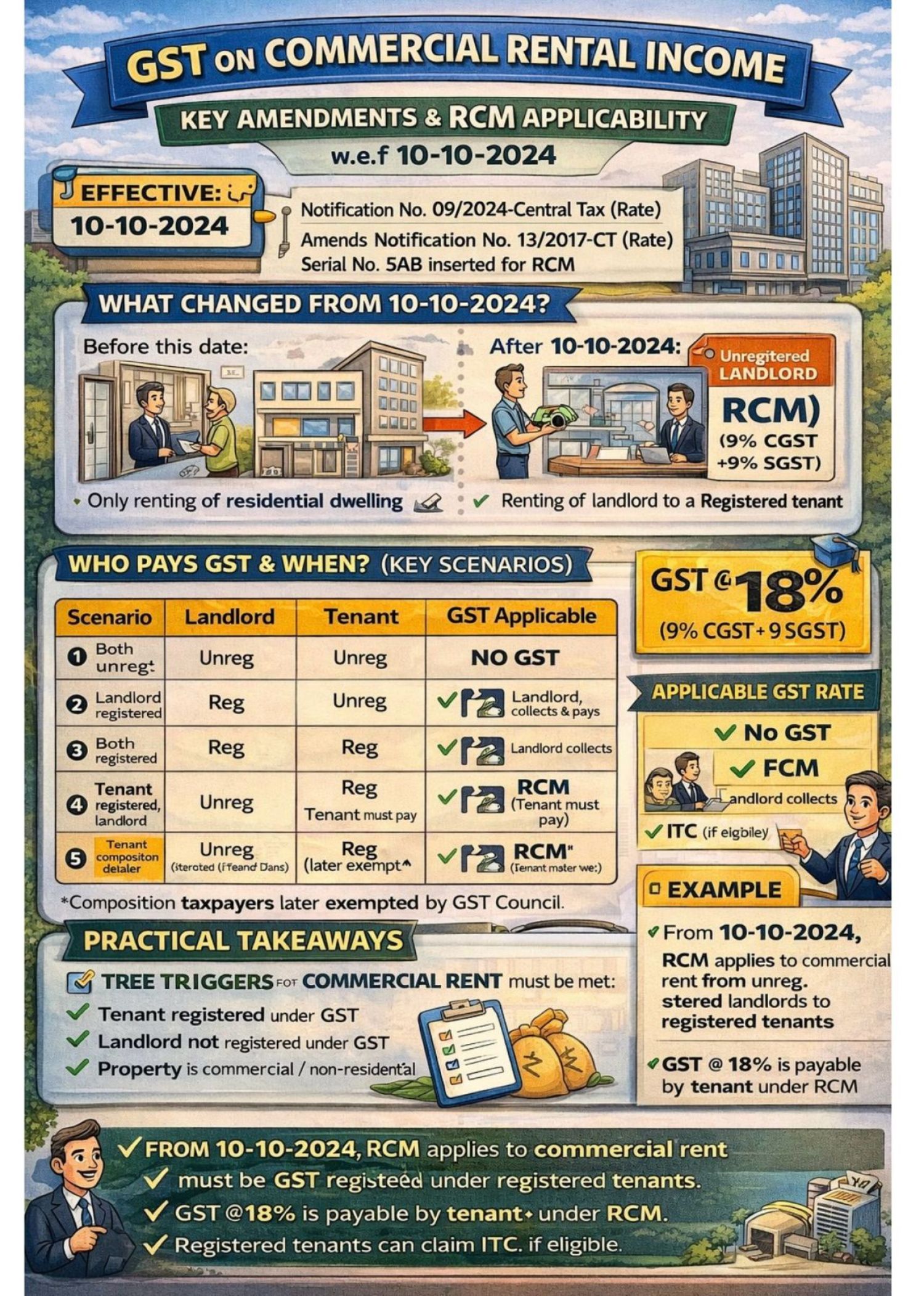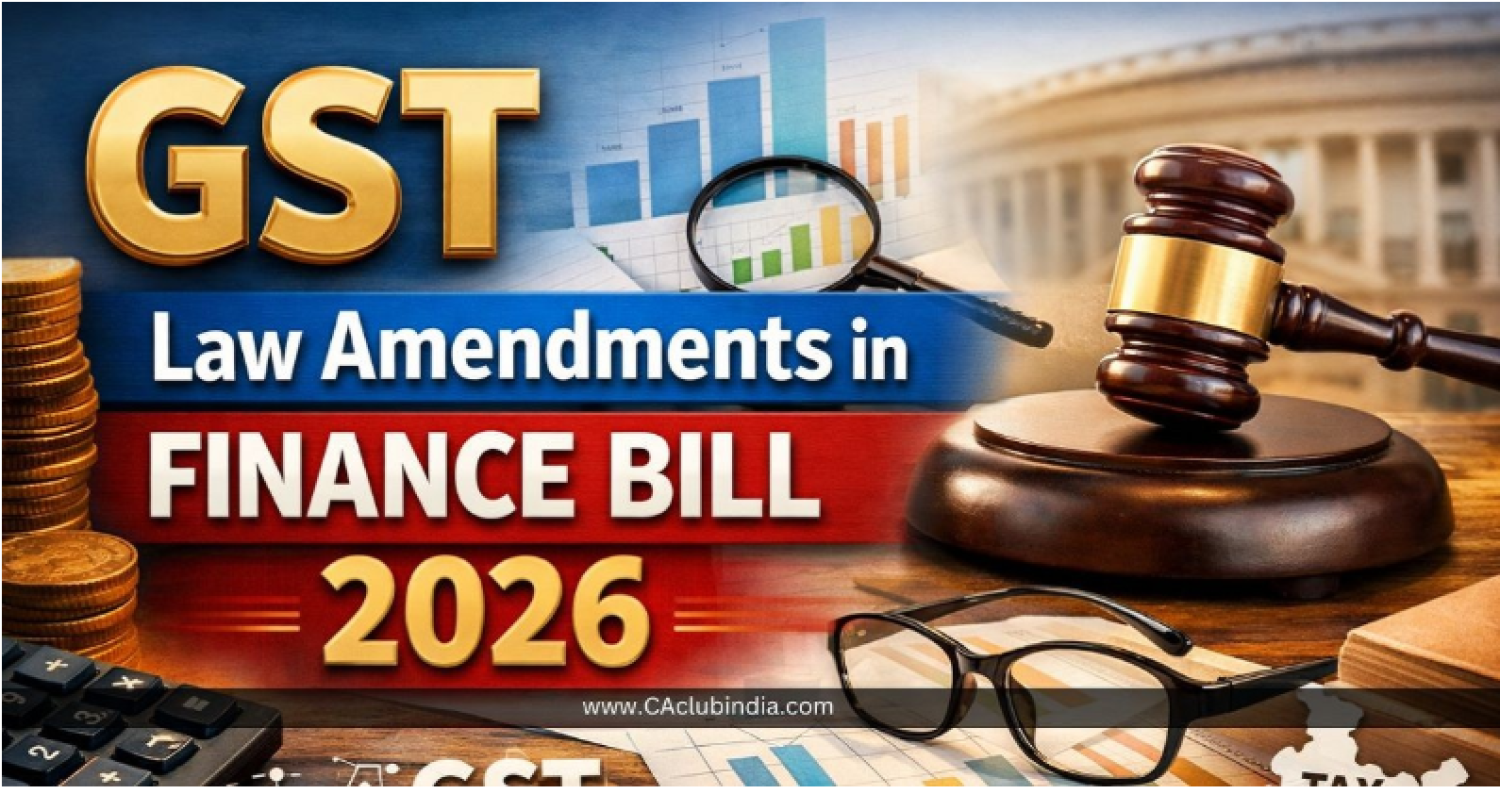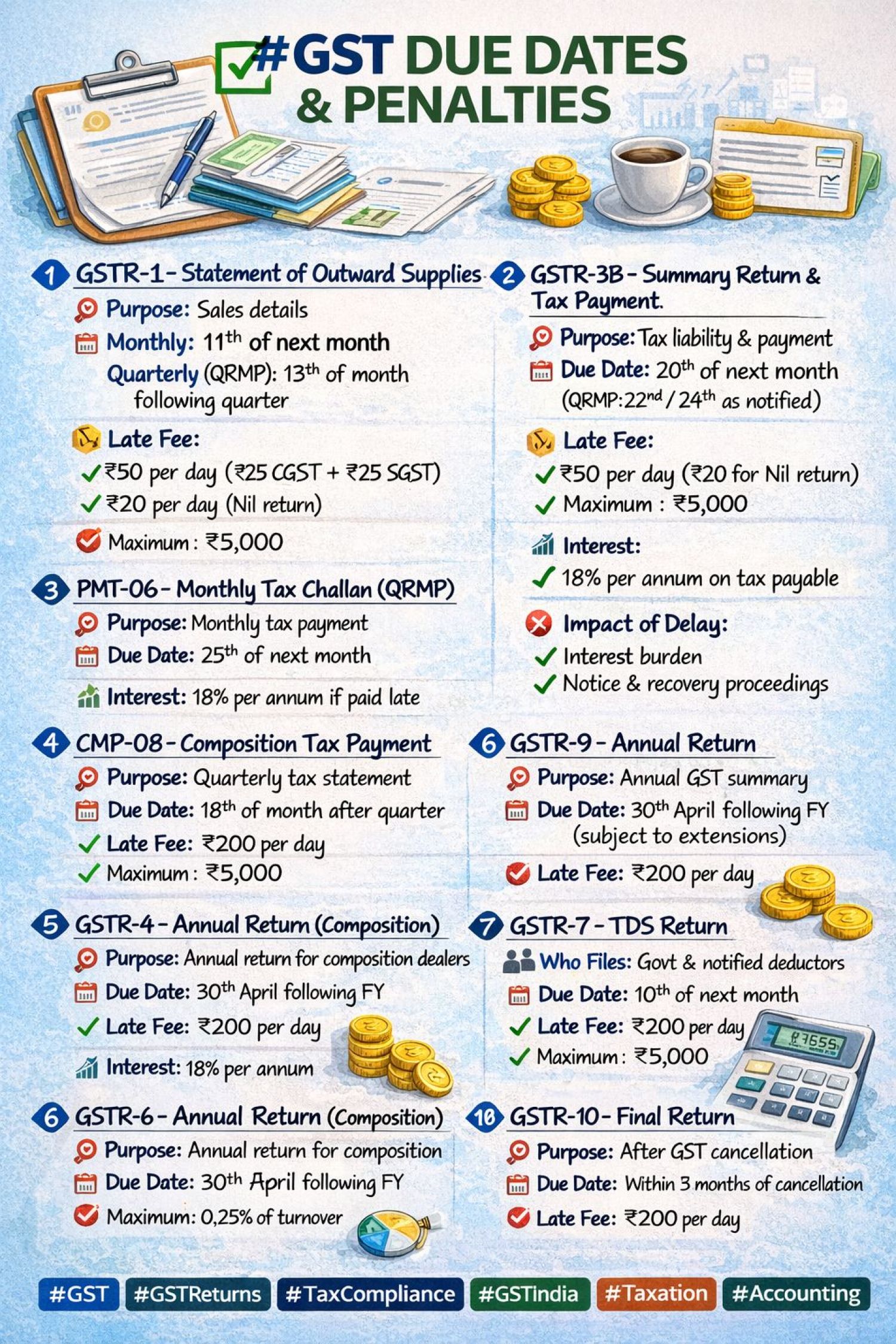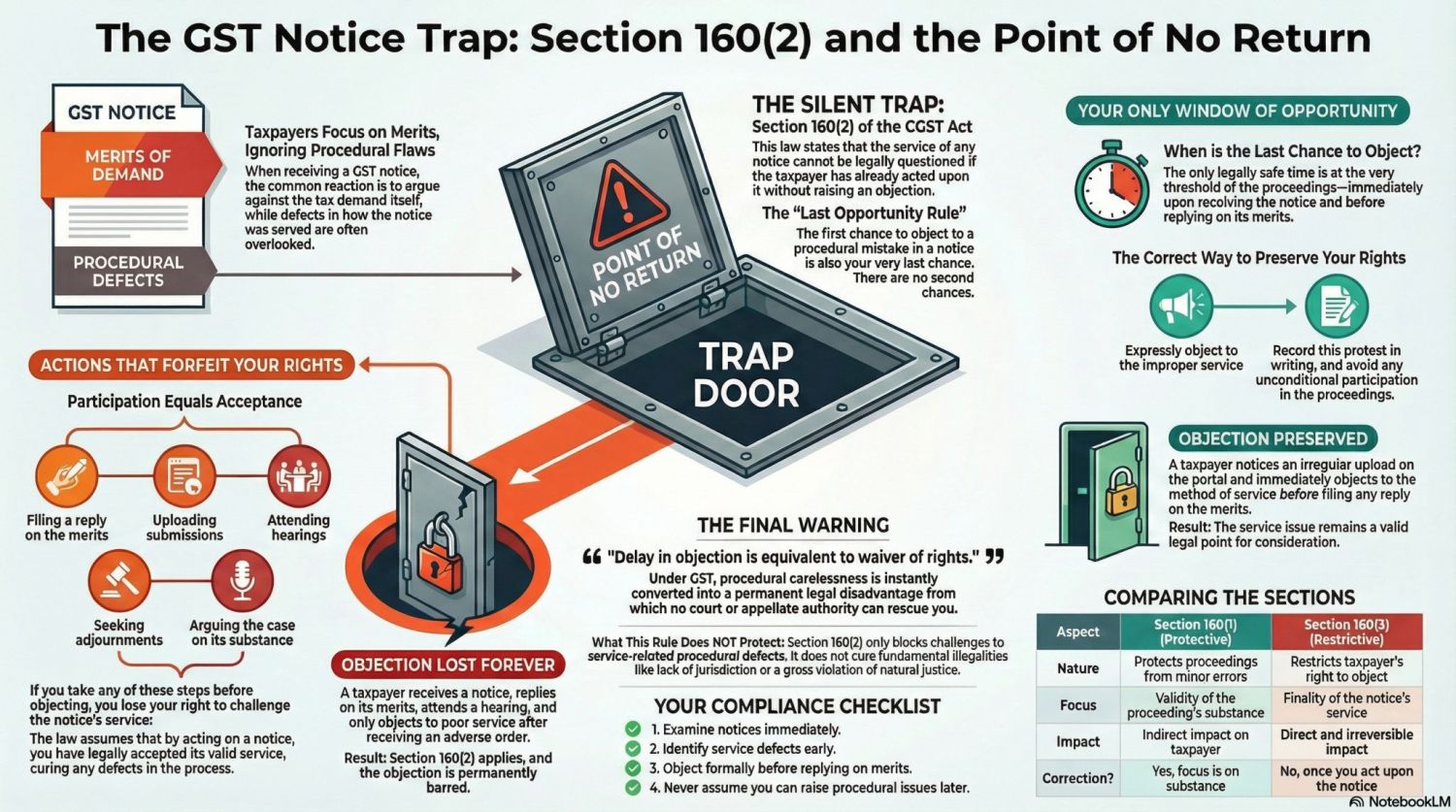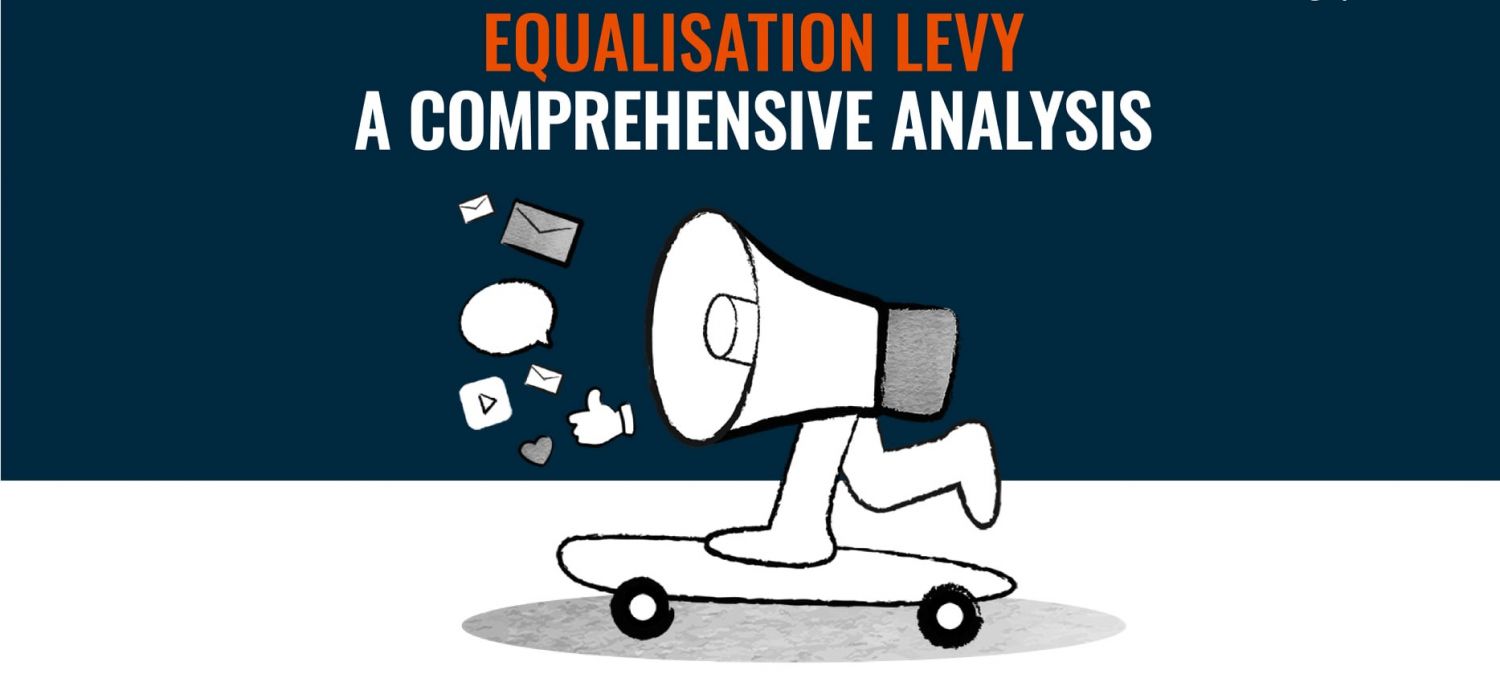
BRIEF INTRODUCTION ON EQUALISATION LEVY ON E-COMMERCE OPERATORS
Equilisation levy was introduced in India in 2016 and the same was substantially implemented in the 2020 Budget. Apart from taxing the online advertisement services, the equalization levy shall also be applicable on the consideration, being received by an e-commerce operator, having turnover exceeding the prescribed threshold limit, and such provisions shall be applicable to supplies made to Indian residents, persons using an Indian IP address, and non-residents in certain cases.
Over the previous few years, the role of information technology within the business has grown manifolds. With the arrival of 4G & 5G technologies, digital transition of companies has been extensively supported. Nowadays, businesses tend to conduct their operations using the digital mediums. Thus, the standard rules of taxation in respect of residency rules or permanent establishment, fails to make an impact. As such, there occurred a robust need to tackle such taxation issues and the same was addressed by the international community. Therefore, the Organization for Economic Co-operation and Development (OECD) under its BEPS project recommended a withholding on payments for digital goods and services provided by foreign e-commerce operators.
As per the Finance Act 2016, equalisation levy was initially introduced and was levied on the procurement of digital advertising services from non-residents and the same was made effective from 01-06-2016. Such a scope of equalisation levy, has been further extended by Finance Act 2020, and thereby include the non-resident e-commerce operators as well. During this article, we'll have a close study of the provisions of equalisation levy on non-resident e-commerce operators in India.
EQUALISATION LEVY ON NON-RESIDENT E-COMMERCE OPERATORS
India’s new 2% equalisation levy policy was made effective from April 1, 2020 and the same was made applicable to the Indian digital supplies made by non-resident e-commerce operators.
Finance Act, 2020 inserted a new section 165A which obliges the non-resident e-commerce operators providing e-commerce supply or services to someone resident in India, to pay equalisation levy @ 2% on the amount of total sale amount received or receivable by such operator from e-commerce services.
MEANING
Equalisation Levy is the tax leviable on amount of consideration received or be receivable in respect of -
- Any of the services specified in the Finance Act 2016 or
- E-commerce operators (Finance Act 2020)
APPLICABILITY
Equalisation Levy is basically a tax, which is withheld at the time of payment by the service recipient. The following 2 conditions shall be met, in order to be liable for payment of equalisation levy -
- Such payment should be had been made to a service provider who is a Non-resident person;
- The annual payment made to any of one service provider shall exceed Rs. 1,00,000 in a particular financial year.
SERVICES COVERED UNDER EQUALISATION LEVY
Currently, certain specified services have been covered under the scope of equalisation Levy. The subsequent services covered:
- Online advertisement
- Any provision of service in respect of digital advertising space or facilities/ service, made with the aim of online advertisement
As and when any other services are notified are included with the aforesaid services.
E-COMMERCE SUPPLY OR SERVICES
E-commerce Supply or services” means:
- Online sale of products owned by the e-commerce operator; or
- Online provision of services, made by the e-commerce operator; or
- Online sale of products or provision of services or both, facilitated by the e-commerce operator; or
- Combination of activities provided in the above three points.
EFFECTIVE DATE FOR APPLICABILITY OF EQUALISATION LEVY
- Equalisation Levy, as provided under the section 165A, shall be charged with effect from 01st April, 2020.
- For the needs of this clause, “online sale of goods” and “online provision of services” shall include one or more of the subsequent online activities, namely:
- acceptance of offer for sale; or
- placing of purchase order; or
- acceptance of the purchase order; or
- payment of consideration; or
- supply of products or making provision of services;
E-COMMERCE OPERATOR
- Where the supplier is covered under the definition of e-commerce operator, then look for the definition of online goods or services.
- If any of the activities mentioned within the definition of Online sale of products or services then the sale is treated as online sale of products or online provision of services because the case may be.
- Sometime E- commerce operator isn't owner of the products and sell goods as a mediator then that consideration should also be considered.
- But if Owner of the products may be a person resident in India & E-commerce operator sell those goods as mediator then that consideration shouldn't be considered.
- Sometime E- commerce operator isn't providing or facilitating service by own but as a mediator then that consideration should even be considered.
- However, where the provider of services is a resident of India & an e-commerce operator is working as a mediator, then that consideration shall not be liable to equilisation levy.
APPLICABILITY OF EQUALISATION LEVY UNDER SECTION 165A
Equalisation levy shall be charged @ 2% of the quantity of consideration received or receivable by a non-resident e-commerce operator from e-commerce supply or services made or provided or facilitated by it-
- To someone resident in India; or
- To a non-resident supplier, under specified circumstances; or
- To someone, buying goods or services or both, by means of internet protocol address located in India.
SPECIFIED CIRCUMSTANCES:
- Sale of advertisement, targeting a customer, being a resident in India or a customer accessing such advertisement using internet protocol address located in India;
- Sale of data and information, being collected from a person resident in India or using internet protocol address located in India;
NON-APPLICABILITY OF EQUALISATION LEVY
- In the subsequent cases, equalisation levy shall not be applicable under section 165A -
- The e-commerce operator having permanent business establishment in India and their e-commerce supply or services has been extensively connected with such permanent establishment; or
- The supplier is providing digital advertising services and is already liable for equilisation levy; or
- Where the turnover or gross receipts of e-commerce operator, arising from e-commerce operations, does not exceed Rs. 2 Crores during the relevant previous year.
RATE OF EQUALISATION LEVY UNDER SECTION 165A
The rate of Equalisation Levy is 2% of the amount of gross consideration received or receivable by the e-commerce operator for e-commerce supply or services.
|
PARTICULARS |
RATE OF EL |
|
TWO PERCENTAGE ON THE AMOUNT OF CONSIDERATION RECEIVED OR TO BE RECEIVED. |
|
TWO PERCENTAGE ON THE AMOUNT OF CONSIDERATION RECEIVED OR TO BE RECEIVED. |
|
TWO PERCENTAGE ON THE AMOUNT OF CONSIDERATION RECEIVED OR TO BE RECEIVED |
THRESHOLD LIMIT OF TURNOVER FOR EQUALISATION LEVY UNDER SECTION 165A
- Equalisation Levy shall be leviable to non-resident e-commerce operator, provided their turnover or gross receipts from such supplies exceeds Rs. 2 crores in a particular previous year.
DUE DATE FOR DEPOSITING EQUALISATION LEVY
- Equalisation Levy shall be deposited by the e-commerce operator on quarterly basis and the due date for the same is as follows -
Compliance timeline: Payments under the Equalisation Levy 2.0 will be due for every year quarter on the subsequent dates:
|
Quarter ended |
Due date of payment of equalisation levy |
|
April-June |
On or before 7th July |
|
July-September |
On or before 7th October |
|
October- December |
On or before 7th January |
|
January- March |
On or before 31st March |
DUE DATES FOR COMPLIANCE
- Due date for furnishing Equalisation Levy Statement (Form-1) will be on and before 30th June of the relevant FY.
INTEREST PENALTY IN CASE OF DELAY
- In case of delay in making payment of Equalisation Levy, the e-commerce operator would be susceptible to pay interest @1% per month or part thereof, on the on delayed amount of EL.
PENALTY FOR FAILURE
- If an e-commerce operator fails to pay the entire or any a part of the equalisation levy as needed u/s 166A, he shall be susceptible to pay a penalty up to the amount of equalisation levy that he did not pay.
RETURNS TO BE FURNISHED
- Every e-commerce operator is required to furnish an annual statement of equalisation levy, containing information as per the Form No. 1 and the same shall be filed, on or before 30th June of the relevant assessment year.
- The said form should be signed and verified using the digital signature or electronic verification code facility.
- In case of failure to furnish the form within the allotted time -
- It would be required to furnish the annual statement in Form No. 1 or revised statement at any time before the expiry of two years from the end of the twelvemonth within which the e-commerce supply or services was made or provided or facilitated.
- Where the e-commerce operator fails to furnish annual statement as well, the A.O. might serve a notice, requiring the e-commerce operator to submit the said statement, within 30 days from the date of service of notice.
With the delay in global consent on the Inclusive Framework, the unilateral measures enacted by the Indian government have made the problems posed by the digitalised economy a reality for several companies. From a global tax management point of view, it's essential for companies to consider these equalisation levies as a part of their global tax planning. Thus, it has now become imperative to assess the implications of the Equalisation Levy 2.0, especially in case of combination of tax optimisation opportunities with the recent ISC ruling on royalties.
However, it is still unclear as to how the affected non-resident businesses could register to comply and the frequency for the filing of the returns.
CALCULATION OF TAX BASE
The calculation of the base on which the rate of levy be calculated is still unclear and many are waiting for additional information on the same from the tax authority.
For example, in case of payment of GST, it's unclear whether the equilisation levy be paid on the entire amount of the sale or only on the portion of margin.
As the base is unclear there's the chance of double taxation if the platform needs to pay the equalisation levy on the complete amount while the underlying seller is additionally required to pay the levy.
NON-COMPLIANCE BY THE SERVICE RECIPIENT
1. Penalty for failure of payment
- Non-deduction of Equalisation Levy: Penalty equal to amount of levy not deducted, along with the interest amount applicable.
- Non-deposit of Equalisation Levy: Penalty equal to Rs. 1,000 per day, maximum up to the amount of levy not deposited.
- Such expenditures shall be disallowed within the hands of the payer.
2. Failure to furnish statement of compliance-
- Rs 100 per day of default.
3. Prosecution
- If a falsity statement has been filed then the person is also subjected to imprisonment of a term of up to three years and a fine.
OTHER GENERAL PROVISIONS
|
SECTION |
PROVISIONS |
|
168 |
PROCESSING OF STATEMENT: STATEMENT FURNISHED WILL BE PROCESSED BY INCOME TAX DEPARTMENT AND AN INTIMATION BE SERVED IN RESPECT OF DEMAND OR REFUND IF ANY. NO INTIMATION BE SENT AFTER THE EXPIRY OF 1 YEAR FROM THE END OF THE RELEVANT FINANCIAL YEAR OF FURNISHING OF STATEMENT OR REVISED STATEMENT. |
|
169 |
RECTIFICATION OF MISTAKE:
|
|
174, ALONG WITH RULE 8 |
|
|
175, ALONG WITH RULE 9 |
|
|
10(50) |
INCOME ARISING FROM ANY E-COMMERCE OPERATION MADE AND CHARGED TO EQUALISATION LEVY SHALL BE EXEMPT FROM TAX. |
GOVERNING SECTIONS
|
APPLICABLE SECTIONS |
|
|
SECTION |
DESCRIPTION |
|
170 |
INTEREST ON DELAYED PAYMENT OF EQUALISATION LEVY |
|
171 |
PENALTY FOR FAILURE TO DEDUCT OR PAY EQUALISATION LEVY |
|
172 |
PENALTY FOR FAILURE TO FURNISH STATEMENT |
|
173 |
PENALTY NOT TO BE IMPOSED IN CERTAIN CASES |
|
174 |
APPEAL TO COMMISSIONER OF INCOME TAX (APPEALS) |
|
175 |
APPEAL TO APPELLATE TRIBUNAL |
|
176 |
PUNISHMENT FOR FALSE STATEMENT |
|
165A |
CHARGE OF EQUALISATION LEVY ON E-COMMERCE SUPPLY OR SERVICES |
|
166A |
COLLECTION AND RECOVERY OF EQUALISATION LEVY ON E-COMMERCE SUPPLY OR SERVICES |
|
167 |
FURNISHING OF STATEMENT IN FORM NO. 1 |
|
168 |
PROCESSING OF STATEMENT |
|
169 |
RECTIFICATION OF MISTAKE |
INDIAN EQUALISATION LEVY 2.0
Equalisation Levy would even be applicable on services provided by the foreign parent company to its subsidiaries/affiliate entities in India, if the services are provided through digital means. an outsized number of MNCs might be providing IT support, online database access, in house portals to shop for goods and other similar services and will be sharing the price of accounting, payroll and other systems with group entities and all such services could very well now inherit the ambit of Equalisation Levy.
ACTIVITIES REFERED TO AS ONLINE ACTIVITIES
Categorisation of payment as Royalty/Fees in respect of Technical Services is more important nowadays. One must be mindful that payments of such nature, if not covered under the Double Taxation Avoidance Agreement (‘DTAA’), might be subject to Equalisation Levy. Taxes covered under the DTAA are creditable unlike Equalisation Levy which don't seem to be and hence increase the tax cost.
It has now been clearly given that conducting anyone or more of the subsequent activities would be considered as online provision of products and services:
- Acceptance of offer for sale
- Placing of purchase order
- Acceptance of order
- Payment of consideration
- Online supply of goods or service.
Hence, even one activity like acceptance of offer etc. can cause the full of the transaction being subject to Equation Levy. CFOs may must seek changes in internal business processes to mitigate the liability of Equalisation Levy in such cases.
It's been clarified that the full consideration for goods/services shall be subject to Equalisation Levy, whether or not the e-commerce operator isn't the owner of goods/services. this could pose a challenge because the liability amount on account of Equalisation Levy might be very high. Companies would should make the difficult decision on whether or not to expire the complete cost to the customer. Since the clarification is applicable retrospectively from 1st April, 2020, the operator may have collected Equalisation Levy only on the commission amount for this era and this might pose a practical challenge because the Equalisation Levy cannot be collected retrospectively from customers. during a recent post budget meeting with industry, CBDT joint secretary, Kamlesh Varshney has agreed that Equalisation Levy should be levied on commission in such cases, but there's no official response.
Besides, since the Equalisation Levy may be a compliance for a far-off enterprise to urge registered in India and charge and pay the same, the Indian businesses are kept insulated from this compliance burden. This doesn't include online advertising. However, this may now cause increased cost within the hands of the Indian customer.
Equalisation Levy at present would be a teething issues and the CFOs would definitely would want to work in sync with several departments, along with the Board of Directors, in order to comply and impede the chance of the unintended transactions being covered under that.
As per the Finance Act, an e-commerce operator is one, who is a non-resident and is undertaking its operations using digital or electronic facility or platform for online sale of products or online provision of services. The term is widely defined to incorporate all companies that maintain some electronic platform to sell goods or services. E-commerce supply or services is additionally broadly defined and includes all kinds of sales of products and services by an e-commerce operator. A gross sales threshold level of INR 20 million (USD 250,000 approx.) is applied to an e-commerce operator each twelvemonth to be subject to the Equalisation Levy 2.0.
The Equalisation Levy 2.0 is expected to have a far-reaching impact, as it covers most of the industries and the threshold limit is significantly not up to the industry threshold; hence it'll impact even small and medium-sized companies. For comparison, the French and UK tax authorities proposed digital tax laws that only apply to companies that generate digital advertising and sell user data and carry higher sales thresholds in way over EUR 25 million and GBP 25 million for France and also the UK, respectively.
The government has clarified that transactions involving royalty or fee for technical services, will remain taxable under the I-T Act and no further equalisation levy of 2% are going to be charged. The equalisation levy is for taxing ecommerce companies which have a robust presence in India, but by billing their customers from offshore units, escape the purview of the country’s tax regime. The 2% levy shall be applicable on the gross amount of consideration, received by non-resident ecommerce companies from Indian residents.
ANNUAL RETURN
The annual return for the Equalisation Levy 2.0 will have to be filed on or before June 30 of the subsequent yr. The Equalisation Levy 2.0 requires foreign companies to get a permanent account number to file the return in India.
- Covered transactions: The Equalisation Levy 2.0 shall be applicable to sale of both goods and services by a non-resident to Indian residents. Hence, if a non-resident sells goods or services to Indian residents through a digital platform and doesn't have a physical presence in India, the Equalisation Levy 2.0 may apply. Transactions termed as either royalty or fee in respect of technical services has been specifically exempted from Equalisation Levy 2.0.
- Goods and Service Taxes: GST and Equalisation Levy 2.0 are basically two different types of taxes. However, transactions where GST applies, the application of Equalisation Levy 2.0 would still be there.
- Supreme Court decision on royalty: Recently, the Indian Supreme Court (ISC) ruled that payments made to non-residents for use/distribution of software mustn't be characterized as “royalties” under India’s tax treaties. Consequently, these payments mustn't trigger Indian withholding within the absence of a permanent establishment (subject to the company’s tax treaty eligibility). The ISC ruled that when income of a non-resident isn't taxable consistent with the tax treaty, the income cannot be brought into the Indian tax net as per the domestic regulations and thus wouldn't be subject to the Equalisation Levy 2.0. the choice of ISC is binding on the ITA and Indian tax courts and would also apply to pending litigations.
Equalization Levy for Google Ads Online Not attached Because it does not accrue in India: ITAT
- The Equalisation Levy version 1.0 will not be appy on Online Google Advertisement incurred only exclusively for Foreign Audience and the Recipient of service is located outside India & advertisement income is not accruing in India- Decided by the Income Tax Appellate Tribunal court's bench of Dr. S. Seethalakshmi (a judge) and Rathod Kamlesh Jayantbhai. Oder - ITA No. 305/JPR/2022 (Jaipur – Trib.)
FAQs ON EQUALISATION LEVY ON E-COMMERCE OPERATORS
Q1: Does online advertisement for private purposes attract the provisions of equalisation levy?
Ans: No provision of equalisation levy shall not be applicable, where the payment is made for private purpose.
Q2: I've got advertised on Facebook to push my business of baking. For this, a payment of Rs. 20,000 was made to Facebook in FY 2019-20. Will the Equalisation levy be leviable to me?
Ans: No, since the annual payments didn't exceed Rs. 1,00,000 in a particular financial year, you're not susceptible for the payment of equalisation levy.

